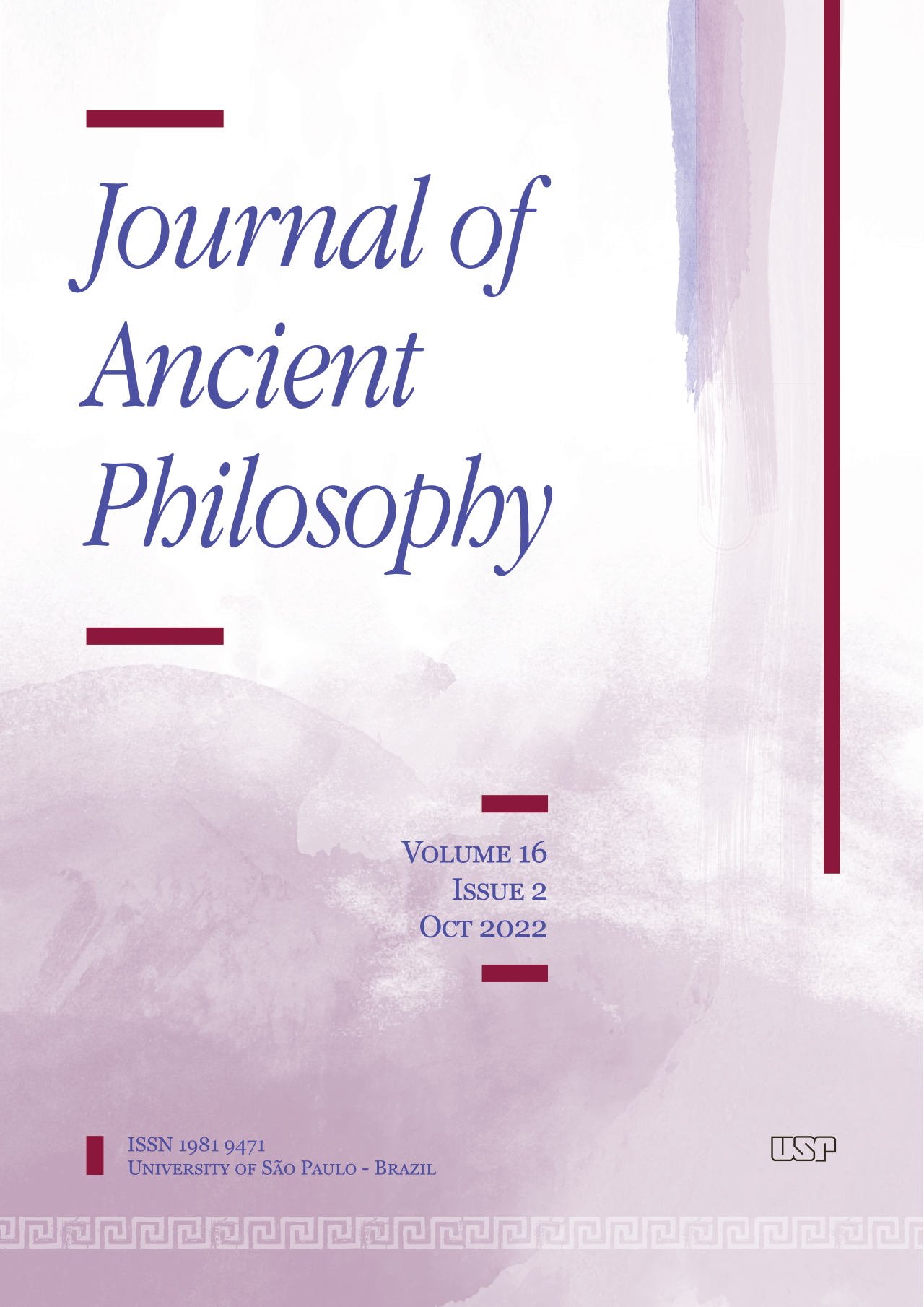Erôs and Intelligible Desire in Plotinus’ Enneads
DOI:
https://doi.org/10.11606/issn.1981-9471.v16i2p182-194Keywords:
erôs, Plotinus, desire, intellectAbstract
In Ennead III.5 On Love, Plotinus' discussion of erôs is underlined by Plato’s discourse on love in the Symposium and the Phaedrus.[1] Plotinus conceives erôs as a purified power, which directs the soul to the intelligible realm of beauty and the world of the Forms.[2] Modern scholarship considers the Plotinian erôs as an ascending power that is always directed to the higher realm of the Forms and never to the lower perceptible realm. Throughout the Enneads, the soul is described as purely and originally an intelligible entity in all its manifestations and expressions (ex. Ennead IV.8).[3] Plotinus particularly supports a dual aspect theory of the soul, in which the homogenous psychē consists of two interrelated aspects - a higher intelligible part related to Intellect, and a lower perceptible part related to the sensible bodies (Caluori, 2015; Remes, 2007; Stamatellos, 2013; Stern-Gillet, 2009). However, limited attention has been paid to the intelligible aspects of the soul's desire in Plotinus' conception of erôs. In this context, this paper aims to revisit the view that Plotinus completely refuted the desire of the physical bodies, and consequently refuted erôs as a power directed to the lower perceptible realm (Ferwerda, 1965; Friedländer, 1964; Hadot, 1963; Wallis, 1995). It is argued that in light of the soul's intelligibility, desire also has an intelligible aspect when it is directed, along with the power of love, to the earthly realm and thus the true intelligible beauty of the perceptible bodies is recognized.
[1] Hereafter, all quotations from Plotinus’ Enneads will solely refer to Armstrong’s (1966-1988) translations.
[2] See Bertozzi (2012, 2021); Tatarkiewicz (1980); Wallis (1995); Wiitala (2013), Vasilakis (2021).
[3] For Plotinus’ theory of the soul, see his treatises in Ennead IV. Also see Blumenthal (1971) and Caluori (2015).
Downloads
References
Armstrong, A.H. (1966-1988). Plotinus 7 vols. Harvard University Press.
Beiewaltes, W. (1986). The love of beauty and the love of God. In A. H. Armstrong (Ed.), Classical Mediterranean spirituality: Egyptian, Greek, Roman. (pp. 293-313). Routledge.
Bertozzi, A. (2012). On eros in Plotinus: Attempt at a systematic reconstruction (with a preliminary chapter on Plato) [doctoral dissertation]. Loyola University Chicago. http://ecommons.luc.edu/cgi/viewcontent.cgi?article=1294&context=luc_diss
Bertozzi, A. (2021). Plotinus on love: An introduction to his metaphysics through the concept of “eros”. Brill.
Blumenthal, H. J. (1971). Plotinus’ psychology: His doctrines of the embodied soul. Springer Netherlands.
Caluori, D. (2015). Plotinus on the soul. Cambridge University Press.
Ferwerda, R. (1965). La signification des images et des métaphores dans la pensée de Plotin. J.B Wolters.
Friedländer, P. (1964). Platon I – III. Walter de Gruyter & Co.
Fleet, B. (2012). Plotinus ennead IV. 8: On the descent of the soul into bodies: Translation, with an introduction, and commentary. Parmenides Publishing.
Gál, O. (2011). Unitas multiplex as the basis of Plotinus’ conception of beauty: An interpretation of ennead V.8. Estetika: The Central European Journal of Aesthetics, 48(2), 172-198.
Hadot, P. (1963). Plotin ou la simplicité du regard. Folio & Gallimard.
Hadot, P. (1990). Plotin: Traité 50 (III.5). Introduction, traduction, commentaire et notes.Les Éditions du Cerf.
Hadot, P. (1993). Plotinus, or the simplicity of vision (M. Chase, Trans.). Chicago University Press.
Kalligas, P. (2009). The enneads of Plotinus: A commentary. Centre of Edition of Ancient Greek Authors.
Kalligas, P. (2014). The enneads of Plotinus: A commentary volume 1 (E.K. Fowden &
N. Pilavachi, Trans.). Princeton University Press.
Miles, M. R. (1999). Plotinus on body and beauty. Blackwell Publishers Inc.
Murdoch, I. (1970). The sovereignty of good. Routledge and Kegan Paul.
Plato. (1952). Plato’s Phaedrus. Cambridge University Press.
Remes, P. (2007). Plotinus on self: The philosophy of the ‘we’. Cambridge University Press.
Stamatellos, G. (2007). Plotinus and the Presocratics: A philosophical study of Presocratic influences in Plotinus’ enneads. SUNY.
Stamatellos, G. (2013). Plotinus on transmigration: A reconsideration. Journal of Ancient Philosophy, 7(1), 49-64. http://dx.doi.org/10.11606/issn.1981-9471.v7i1p49-64
Stern-Gillet, S. (2009). Dual selfhood and self-perception in Plotinus’ enneads. Epoché, 13(2), 331-345. https://doi.org/10.5840/epoche200913210
Stocks, J. L. (1915). Plato and the tripartite soul. Mind, 24(94), 207-221. https://doi.org/10.1093/mind/XXIV.2.207
Stubenberg, L. (2016, December 21). Neutral monism. Stanford Encyclopedia of Philosophy. https://plato.stanford.edu/archives/win2016/entries/neutral-monism/
Tatarkiewicz, W. (1970). History of aesthetics. Vol 1 – ancient aesthetics. (A. Czerniawski & A. Czerniawski, Trans.). The Hague Mouton.
Tatarkiewicz, W. (1980). A history of six ideas: An essay in aesthetics. Scientific Publishers.
Vasilakis, D. A. (2021). Eros in Neoplatonism and its reception in Christian philosophy: Exploring love in Plotinus, Proclus and Dionysius the Areopagite. Bloomsbury Academic.
Wallis, R. T. (1995). Neoplatonism. Dukworth.
Wiitala, M. O. (2013). Desire and the good in Plotinus. British Journal for the History of Philosophy, 21(4), 649-666. http://dx.doi.org/10.1080/09608788.2013.792241
Wolters, A. M. (1984). Plotinus “on eros”: A detailed exegetical study of enneads III,
ICS Publications.
Downloads
Published
Issue
Section
License

This work is licensed under a Creative Commons Attribution-NonCommercial 4.0 International License.
Copyright
Authors who publish with this journal agree to the following terms:
- Authors retain copyright and grant the journal right of first publication with the work simultaneously licensed under a Creative Commons Attribution License (CC By 4.0) that allows others to share the work with an acknowledgement of the work's authorship and initial publication in this journal.
- Authors are able to enter into separate, additional contractual arrangements for the non-exclusive distribution of the journal's published version of the work (e.g., post it to an institutional repository or publish it in a book), with an acknowledgement of its initial publication in this journal.
- Authors are permitted and encouraged to post their work online (e.g., in institutional repositories or on their website) prior to and during the submission process, as it can lead to productive exchanges, as well as earlier and greater citation of published work (See The Effect of Open Access).


